

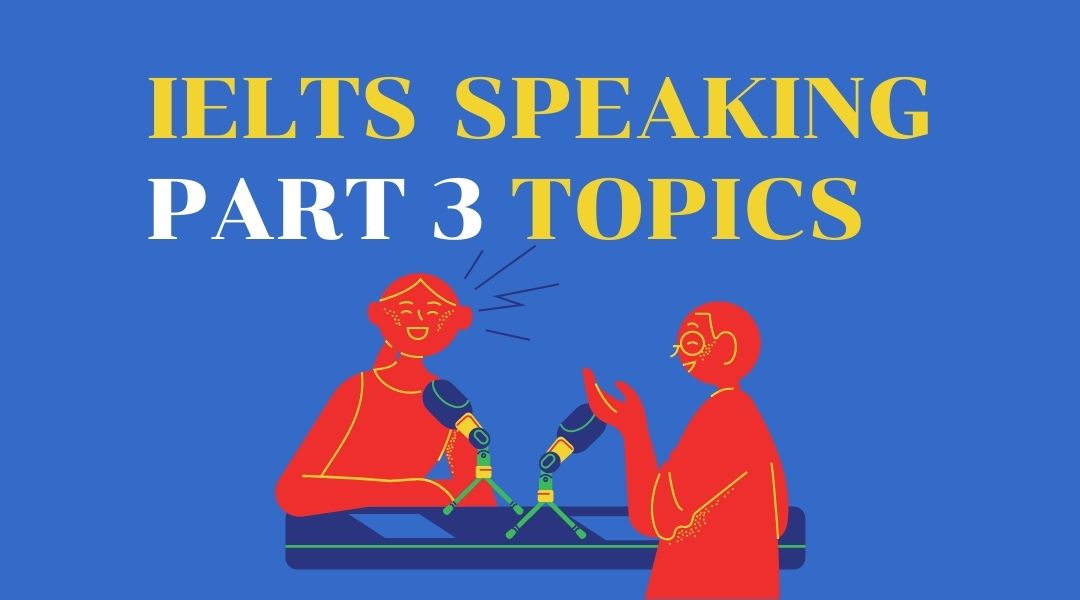
IELTS Speaking Part 3 là cơ hội để bạn thực sự thể hiện khả năng sử dụng tiếng Anh linh hoạt trong việc thảo luận chi tiết và chuyên sâu về một chủ đề. Thí sinh sẽ phải sử dụng nhiều cấu trúc câu phức tạp hơn để đánh giá và chứng minh cho các ý tưởng và quan điểm của bản thân.
Không giống như IELTS Speaking part 1 và part 2, IELTS Speaking part 3 topics không xoay quanh bạn hay cuộc sống, trải nghiệm cá nhân của bạn, thay vào đó là những câu hỏi mang tính xã hội nhiều hơn.
Trong bài viết này, LangGo sẽ giúp các bạn có cái nhìn tổng quan về part 3 cũng như IELTS Speaking part 3 topics thường xuyên xuất hiện để bạn có thể luyện tập hiệu quả nhất.
Sau khi bạn hoàn thành bài nói của mình trong part 2, giám khảo sẽ tiếp tục hỏi bạn một số câu hỏi liên quan đến chủ đề bạn vừa nói.
Ví dụ: Nếu câu hỏi part 2 của bạn là: ‘Describe a time someone helped you achieve a goal’ (Miêu tả một lần ai đó giúp bạn đạt được mục tiêu) thì trong IELTS Speaking part 3, bạn có thể được hỏi về:
setting goals (đặt mục tiêu)
reaching goals (đạt được mục tiêu)
being successful (trở nên thành công)
motivation (động lực)
motivating children and adults to learn (thúc đẩy trẻ em và người lớn học tập)
IELTS Speaking part 3 thường kéo dài từ 4 đến 5 phút. Giám khảo sẽ hỏi bạn khoảng 4 đến 6 câu hỏi.
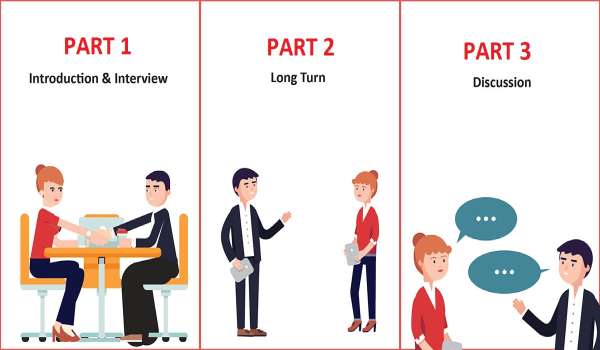
Phần thi IELTS Speaking part 3 kéo dài trong khoảng từ 4 đến 5 phút
Một số câu hỏi đã được soạn sẵn, nhưng giám khảo cũng có thể hỏi các câu hỏi ngẫu hứng dựa trên câu trả lời của bạn, vì vậy không thể biết trước được là bạn sẽ gặp những câu hỏi nào trong IELTS Speaking part 3 topics.
Tuy nhiên việc làm quen với các dạng câu hỏi mà bạn có thể nhận được trong part 3 sẽ giúp ích rất nhiều cho quá trình ôn tập của bạn. Dưới đây là một số ví dụ về các dạng câu hỏi IELTS Speaking part 3 mà bạn có thể nhận được:
How has …………. changed in recent years?
How will ……….. change in future?
How could we make ………. better?
Why do people do ………?
What are the advantages and disadvantages of ………?
Ví dụ:
How has shopping changed in recent years?
How do you think the family will change in the future?
How could we make our cities better?
Why do people throw rubbish on the streets?
What are the pros and cons of globalization?

Các câu hỏi về IELTS Speaking part 3 topics thường là về lý do hoặc cách thức
Câu trả lời với các IELTS Speaking part 3 topics cần dài hơn part 1 bởi bạn sẽ cần phân tích ý kiến của mình sâu hơn, chi tiết hơn. Vậy làm thế nào để trả lời câu hỏi IELTS Speaking part 3 topics vừa đúng trọng tâm, vừa thể hiện được khả năng sử dụng từ vựng và ngữ pháp đa dạng của mình?
Đầu tiên bạn cần biết cách phát triển ý tưởng cho câu trả lời của mình. Để thực hiện được bước này có nhiều cách tiếp cận khác nhau, nhưng cách tốt nhất là triển khai theo cấu trúc O.R.E. như sau:
Opinion (ý kiến)
Reason (lý do)
Example (ví dụ)
Cùng phân tích ví dụ sau đây để hiểu hơn về cấu trúc này nhé.
‘How have newspapers changed in recent years?’ (Các tờ báo đã thay đổi như thế nào trong những năm gần đây?)
Với câu hỏi này, bạn có thể phát triển câu trả lời của mình theo 3 phần sau đây:
Phương pháp triển khai ý tưởng theo O.R.E sẽ giúp bạn nói trôi chảy, mạch lạc hơn, đồng thời nó cũng tạo cơ hội để bạn sử dụng cấu trúc ngữ pháp phức tạp hơn. Điều này nghĩa là bạn có thể đạt được cùng lúc hai tiêu chí Fluency and Coherence và Grammar.
Ngoài ra bạn có thể mở rộng thêm câu trả lời của mình bằng cách thêm bước thứ 4 (O.R.E.C.):
Opinion
Reason
Example
Consequence (kết quả)
Ví dụ:
Dưới đây, LangGo sẽ tổng hợp cho bạn một số IELTS Speaking part 3 topics phổ biến với các chủ đề nhỏ hơn (Subtopics) cùng một số câu hỏi thường gặp trong chủ đề đó.
IELTS Speaking part 3 topics: ANIMAL
Một số chủ đề nhở hơnhơn bạn có thể gặp trong topic về Animal (động vật) như:
Wild animals
Hunting and extinction
Zoos
Pets
Animals in research
Ví dụ giám khảo có thể hỏi bạn một số câu như:
Are there any wild animals in your country that are not found in any other country?
Do you think it is right to keep wild animals in captivity all their life?
How do you feel about the use of animals for medical research?
What should we do to protect endangered animals?
IELTS Speaking part 3 topics: ART
Các chủ đề nhỏ hơn trong topic này bao gồm: exhibitions, modern art, role of art at school, museums, digital art, art at home, graffiti, …
Ví dụ về câu hỏi với chủ đề này:
Why does art help to nurture creativity?
Do you think that art is as important as academic subjects when it comes to educating children?
Why do you think some people enjoy looking at paintings and sculptures and others do not?
IELTS Speaking part 3 topics: BOOKS
Với chủ đề Books, các câu hỏi thường xoay quanh một số topic phụ như sau:
Reading for pleasure
Novels
Digital books
Online book shops
Books and learning
Ví dụ:
Do you think that it is more valuable to read a book than to watch television?
What kind of books are considered good reads in your opinion?
How do you think people will read in the future?
IELTS Speaking part 3 topics: CHILDHOOD
Các chủ đề phụ bao gồm: play, games, toys, behavior, obeying parents, study
Ví dụ:
Is it important to have pleasant childhood memories?
Do you think that people are permanently affected by negative childhood memories?
What is more important for a child’s happiness, many toys or many friends?
IELTS Speaking part 3 topics: CLOTHES
Một số chủ đề phụ xoay quanh topic Clothes như: fashion, buying online clothes, clothes industry, brand names
Ví dụ các câu hỏi trong IELTS Speaking part 3:
Why do some people care about following fashion trends?
What kinds of clothes do people wear after work?
What is the advantage of buying online clothes?
IELTS Speaking part 3 topics: EDUCATION
Subtopics: Teachers, learning, online learning, preparing for work, skills, universities, sciences versus humanities
Với chủ đề Education (giáo dục) giám khảo có thể hỏi bạn các câu sau:
Does education guarantee a good job?
Do you think your country should spend more money on schools?
Is it difficult for people without a college education to get good jobs where you live?
Are college tuitions reasonable in your country?
IELTS Speaking part 3 topics: ENVIRONMENT
Subtopics: Global warming, pollution, animals becoming extinct, wildlife protection, deforestation, companies responsibility, individual versus government role
Một số ví dụ về câu hỏi bạn có thể bắt gặp trong IELTS Speaking part 3:
What do you think is the main danger the world faces in terms of the environment?
What is the penalty for littering in your country?
What are some things that your community is doing to help the environment?
IELTS Speaking part 3 topic: FAMILY
Subtopics: Family structure and size, the role of grandparents, care of the elderly, relationships, extended family
Ví dụ:
In a typical family, who plays the leading role?
In your country, what kinds of family members usually live together?
Do young and middle-aged people live with old people?
IELTS Speaking part 3 topics: FOOD
Subtopics: Restaurants, diets, fast food, healthy eating, obesity, food and children, GM food, supermarkets
Ví dụ:
Why do you think some people choose to be vegetarians?
Is the food that people eat today in your country different from the food that people used to eat in the past?
How do you think the way we eat will change in the future?
IELTS Speaking part 3 topics: HEALTH
Subtopics: Exercise, diet, gyms, routines, obesity, disease, coronavirus, stress
Ví dụ:
Do women pay more attention to their health than men?
Could governments do more to promote healthier lifestyle options?
Do you think most people worry more about their health as they get older?
What do old people in your country do to keep fit?
IELTS Speaking part 3 topics: CHARITY
Subtopics: Helping others, charities, fund-raising, skills needed, helping poor countries, international aid
Ví dụ:
Do you think charities are important?
Do you think that children should be made to do volunteer work as part of their school curriculum?
If you could donate a large amount of money to any charity, what would it be?

Một số IELTS Speaking part 3 topics phổ biến
IELTS Speaking part 3 topics: HOME
Subtopics: Buying and renting homes, types of accommodation, children leaving home, decorating homes, local community
Ví dụ:
Why do some people buy lots of things for their home?
Do you think it is very expensive to make a home look nice?
In what ways is living in a flat/apartment better than living in a house?
IELTS Speaking part 3 topic: JOBS
Subtopics: Popular jobs, future jobs, the atmosphere at work, motivation, training
Ví dụ:
Is salary important to you? What is the impact of salary on doing work?
What kinds of jobs are popular in your country?
Should young adults work abroad?
Is it hard to find an interesting job in your country?
IELTS Speaking part 3 topic: MUSIC
Subtopics: Modern versus traditional, national anthems, style and genres, live concerts, listening to music, being a musician
Ví dụ:
Why do you think that some local singers or musicians aren’t as successful as some from other countries?
Do you think the Internet has affected the music industry? In what ways?
Do you think there will be further changes in the music industry in the future?
IELTS Speaking part 3 topic: NEWS
Subtopics: Local versus international, online news, newspapers, reliability, fake news, getting news, family news, journalism
Ví dụ:
Do you think it’s important to keep up with the news?
Do you think that news is censored in some countries?
What would the world be like without news?
IELTS Speaking part 3 topic: PHOTOGRAPHY
Subtopics: Taking photos, storing photos, photos as an art form, photos at home, professional photos, selfies
Ví dụ:
What kinds of devices do people like to use for taking photos these days?
Why do some people like to keep photos?
Has the way people take photos changed?
What are the pros and cons of digital photography?
IELTS Speaking part 3 topic: SHOPPING
Subtopics: Real shops versus online shopping, payments, men and women shopping, habits, fashion, local shops versus shopping malls
Ví dụ:
Do all people enjoy shopping for clothes?
Why women like to go shopping?
Do you think it is good for people buy expensive clothes? Why?
IELTS Speaking part 3 topic: SPORTS
Subtopics: Fitness, gyms, benefits, equipment, extreme sports, Olympic Games, international competitions
Ví dụ:
What kinds of sports are popular in your country?
What else people can do to keep fit besides sports?
Do you think young people should play dangerous sports?
What do parents do to make their children like sports?
IELTS Speaking part 3 topic: TECHNOLOGY
Subtopics: Artificial Intelligence, the Internet, safety, computers, mobile phones, stress, robots, social media
Ví dụ:
What is the most common type of technology used by people in your country?
Is it possible to live without technology?
What is the impact of technology on people’s lives?
How do you think modern technology will change the way people work in the future?
IELTS Speaking part 3 topics: TEAMWORK
Subtopics: Benefits, challenges, competition, children, teamwork at work, international competition in trade
Ví dụ:
Do you think people enjoy doing things in groups?
Is teamwork important?
What are the advantages of working in a team?
IELTS Speaking part 3 topic: TRANSPORTATION
Subtopics: Public versus private, advantages and disadvantages, transport in the future, electric cars
Ví dụ:
What measures should the government take to solve transportation problems?
What types of public transport can be found in your country?
Are there any public transport problems in your country?
How to encourage more people to take public transportation?
IELTS Speaking part 3 topics: TRAVEL
Subtopics: Forms of transport, global warming, holidays, tourism, eco-tourism, travel abroad versus domestic, safety
Ví dụ:
Do people in your country like to travel?
How has traveling changed, compared to several decades ago?
When do people travel (as tourists), whom do they usually go with?
IELTS Speaking part 3 topic: WEATHER
Subtopics: Global warming, seasons, extreme weather, impact on life, weather forecasts
Ví dụ:
Do you think the weather has an influence on people’s mood?
How do you feel about the climate in recent years?
What can we do to stop the greenhouse effect?
What are the possible results if the temperature continues going up?
IELTS Speaking part 3 topic: MONEY
Subtopics: Credit cards, reasons of poverty, waste of money, taxes, money donation
Ví dụ:
Why do young people tend to waste money?
What kinds of things do people like to buy in your country?
What are some reasons for people being poor? Can poverty be avoided?
IELTS Speaking part 3 topic: POLLUTION
Subtopics: Types of pollution, anti-pollution programs, increasing awareness about environmental pollution
Ví dụ:
What are some types of pollution?
Whom do you think is more responsible for pollution, individual people or the government?
Do you know about any anti-pollution programs in your community?
What should we do to increase awareness about environmental pollution?
IELTS Speaking part 3 topic: GENERATION GAP
Advantages and Disadvantages of living with old people, causes of the generation gap, solutions to generation gap problems
Ví dụ:
Why do some young people dislike living with old people?
What are the advantages of living with old people?
What are the causes of the generation gap?
What do you think would be a good solution to the generation gap problem?
IELTS Speaking part 3 topic: CELEBRITIES
Subtopics: Influences of celebrities on young people, special talents, the privacy of famous people
Ví dụ:
Are famous people always happy?
To be famous, do you think a person needs to have some special talent (or ability)?
How do people invade the privacy of famous people?
IELTS Speaking part 3 topic: FRIENDS
Subtopics: Childhood friends, maintain friendship, qualities of a good friend, breakdown of a good friendship
Ví dụ:
How do people in your country make friends these days?
Why is it hard to maintain friendships?
Why is it easier to make friends on the internet than in reality?
IELTS Speaking part 3 topics: CULTURE
Subtopics: Cultural diversity, culture shock, the important value of your culture, benefits of learning about another culture
Ví dụ:
Do you think it’s important to know about other cultures?
How can we benefit from learning about other cultures?
What do you think is the best way to learn about another culture?
IELTS Speaking part 3 topics: ADVERTISING
Subtopics: Attitude towards advertisements, influence on children, harmful and beneficial effects of advertising, different methods of advertising
Ví dụ:
Do young and old people show the same attitude towards advertisements?
Are advertisements a good or bad influence on children?
What is the most popular way of advertising?
Với từng IELTS Speaking part 3 topics lại có những từ vựng riêng biệt chỉ thuộc về riêng chủ đề đó. Vì vậy việc học từ mới theo chủ đề là rất cần thiết nếu bạn muốn đạt được band điểm cao.
Cùng theo dõi cách Simon - giáo viên IELTS kỳ cựu giải quyết các câu hỏi trong IELTS Speaking part 3 topics như thế nào nhé!
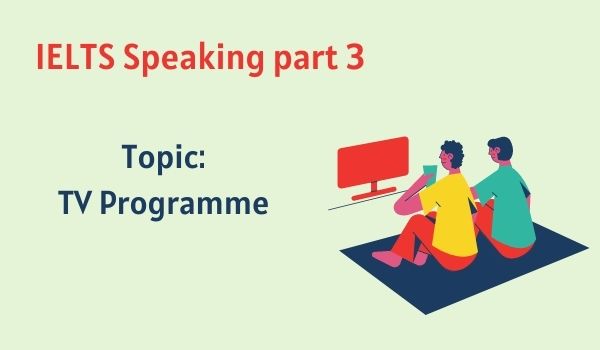
IELTS Speaking topic part 3 về các chương trình truyền hình
Câu hỏi 1: Do you think most people watch TV for education or for entertainment?
I think people watch TV primarily for entertainment. There are far more entertainment programmes than educational ones, and in my experience, most people treat television as a form of relaxation in the evening.
If I think about the most popular TV programmes in the UK, such as talent shows like 'X Factor' or soap operas like 'Eastenders', the focus is definitely on entertainment rather than education.
Câu hỏi 2: Should TV play a role in educating children? How?
Yes, it definitely should play a role in my opinion. Good children's TV programmes should tell stories that contain some kind of lesson about how to behave or what is morally right and wrong.
Many of the traditional fairy tales, such as 'Cinderella', have been made into TV programmes, and there is always a positive message in those stories.
Câu hỏi 3: How do you think TV viewing habits change as people get older?
TV viewing habits obviously change a lot as we get older. While toddlers might watch programmes about talking animals, teenagers prefer action and adventure or sports, and as adults, we start taking an interest in news and politics.
My own preferences, for example, have changed over the years I would never have watched news programmes when I was younger. I think it would be very strange if our viewing habits didn't mature!
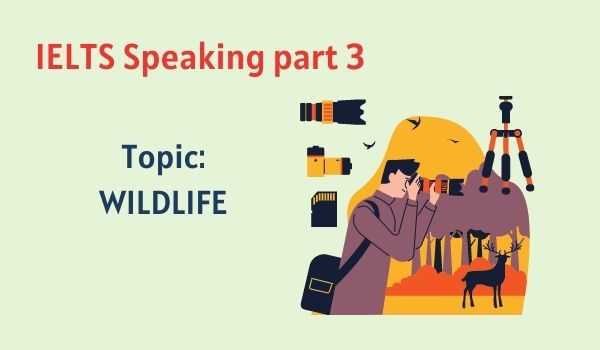
Các câu hỏi trong IELTS Speaking part 3 topics Wildlife thường xoay quanh mối quan hệ giữa con người và thế giới hoang dã
Câu 1: What effects do you think humans have on wild animals?
Humans have a huge impact on wild animals. We have destroyed many animals that are in danger of extinction. Tigers and rhinos, for example, are endangered species because of humans. The pollution and waste that we produce also have an effect on animals. In some places, there are no fish in the rivers.
Câu hỏi 2: What measures could we take to protect wildlife?
I think we need stricter rules to protect natural areas and the wild animals that live there. For example, we should stop cutting down trees in the rainforest. National parks are a good idea because they attract tourists while protecting wildlife.
Câu hỏi 3: Is it the responsibility of schools to teach children about protecting wildlife?
Yes, schools can play a big part in educating children about this Children how to look after the natural environment. Schools already teach children about endangered species and the destruction of rainforests, so hopefully, future generations will a better job of protecting wildlife.
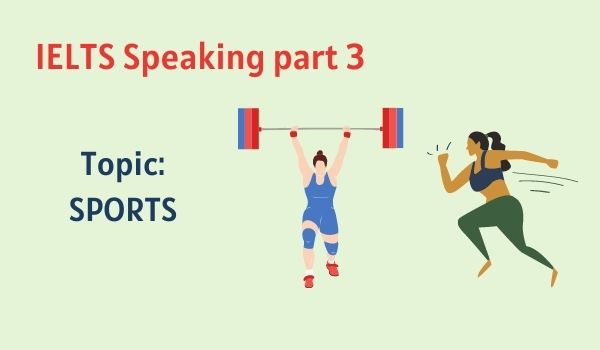
Thể thao là một trong những IELTS Speaking part 3 topics phổ biến nhất
Câu hỏi 1: Why do you think sport is important?
I think sport is important for different reasons. For me, doing a sport is about having fun. When I play football, for example, I forget about everything else and just enjoy myself. Also, doing a sport helps you to keep fit and healthy, and it's a good way to socialize and make friends.
Câu hỏi 2. Do you think famous sportspeople are good role models for children?
I think that sportspeople should be good role models. Children look up to their favorite football players, like David Beckham for example, so I think that these people have an enormous responsibility. They should try to be a good influence, and behave in the right way.
Câu hỏi 3. Do you agree that sports stars earn too much money?
In my opinion, it's fair that the best sportspeople earn a lot of money. Being a top sportsperson requires hours of practice, and there are millions of sports fans who are willing to pay to see them play. If we don't want sportspeople to earn so much money, we shouldn't go to watch them.
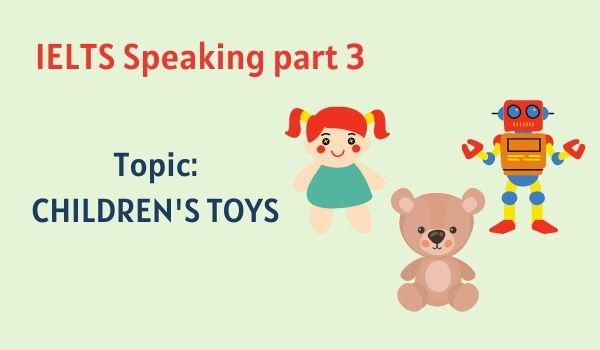
IELTS Speaking part 3 topics về Children’s toys (Đồ chơi trẻ em)
Câu hỏi 1. Do you think it's important for boys to play with "boys' toys" and for girls to only play with "girls' toys"?
I think boys naturally seem to prefer playing with "boys' toys" and girls with "girls' toys". When I was young I had toy cars, trucks, guns and things like that, whereas my sister always wanted to play with dolls.
I don't suppose it really matters if a boy plays with a doll or a girl plays with a toy car, but children learn quickly what toys are supposed to be for boys and for girls.
Câu hỏi 2. Do you think it's good if parents only buy "educational" toys for their children?
No, I don't agree with only giving children educational toys. In my opinion, children learn by playing with whatever interests them. Children invent their own games, even if they don't have any toys at all.
It's important for children just to have fun; there will be plenty of time for parents to worry about education when their children get older.
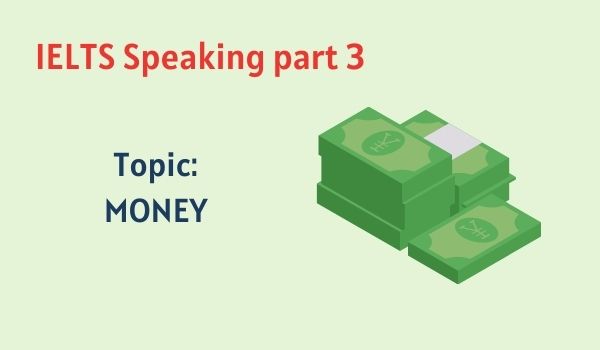
Với chủ đề Money các câu hỏi thường liên quan đến thói quen tiết kiệm và chi tiêu tiền
Câu hỏi 1: Why is it important for people to save some of their money?
In the long term, I think it's important to save for retirement, but it's also a good idea to have a certain amount of money saved so that you can deal with unexpected problems in the less distant future.
For example, I've learnt to put some money aside for car repairs, and this came in useful recently when I needed to have my car's brake pads changed. If I hadn't had savings, the cost of getting my car repaired could have sent me into the red.
Câu hỏi 2: In your view, should children be taught how to manage money?
Not at school, no. I believe it's the job of parents to gradually teach children that kind of thing, or perhaps there's no need for anyone to teach children about money because they learn about it naturally as they grow up.
For example, I remember being given money to buy sweets or an ice cream when I was a child, and I soon learnt what I could afford and what I couldn't.
Câu hỏi 3: Do you think that girls are better at saving money than boys?
I've never thought about that before. I don't see any reason why girls would be better savers than boys or vice versa. I suppose it depends more on the personality of each individual and what their interests are.
For example, a child who likes cheap toys might not think about saving, whereas a child who wants to buy something expensive, like a bike or a games console, might summon the willpower to save up!
Nguồn: IELTS Simon
Trên đây là những thông tin bạn cần biết về IELTS Speaking part 3 như dạng câu hỏi, cách trả lời và mở rộng ý. Ngoài ra, LangGo cũng đã tổng hợp các IELTS Speaking part 3 topics và một số ví dụ mẫu giúp bạn ôn luyện hiệu quả và đúng trọng tâm hơn.
Bên cạnh đó, các bạn cũng có thể tham khảo thêm các bài viết khác để trau dồi và tích lũy thêm kinh nghiệm và kỹ năng trả lời các câu hỏi IELTS Speaking nhé.



ĐẶT LỊCH TƯ VẤN MIỄN PHÍ LỘ TRÌNH Săn ƯU ĐÃI lên tới 12.000.000đ